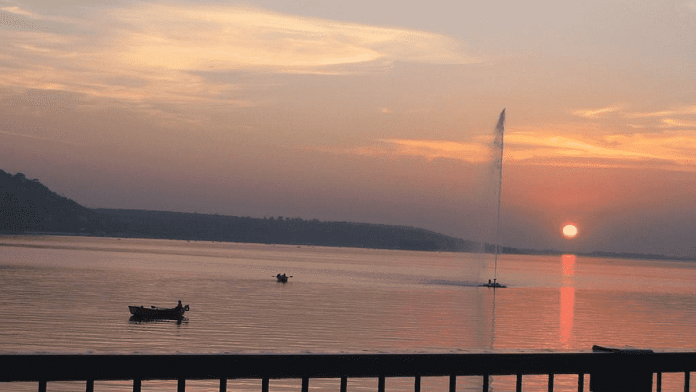Bhopal: The National Green Tribunal has fined the Bhopal Municipal Corporation (BMC) Rs. 1 crore for environmental and ecological damages caused to the city’s iconic Bhojtal or Bhopal Lake — a major tourist attraction in the city and a Ramsar site — by allowing construction in the lake’s protected areas.
A Ramsar site is a wetland site designated to be of international importance under the Ramsar Convention of 1971. Bhopal’s Bhojtal, a lake built by MP’s 11th century king Bhoja from the Paramara dynasty, has been recognised as a Ramsar site since 2002 — the only man-made lake on that list.
In its ruling on 11 July, the NGT, headed by Justice Sudhir Agarwal, said that the illegal construction — 22 cement pillars — were merely 50 meters from the full tank level (FTL) of the water body and was therefore in violation of Wetland Rules 2017.
An FTL is a term used to denote the maximum capacity of a water body, such as a lake or a pond. A land marked as FTL is located within the boundaries of a water body and is subject to rules.
Invoking the ‘Polluter Pays’ principle of environmental law, the NGT said: “We are thus satisfied that construction in question by proposing to raise RCC pillars in such a huge-numbers, in and at the prohibited area of Bhoj Wetland i.e. within ‘Zone of Influence’, is clearly illegal and impermissible, and cannot be allowed [sic]”.
ThePrint has accessed a copy of the order.
The ‘polluter pays’ principle states that the person causing the pollution must pay for the damage it has caused the environment.
The ruling came on the back of a complaint by Bhopal-based environmentalist Rashid Noor Khan. In his application before the NGT, Khan said that the pillars were within 50 metres from the mean high flood level at Bhoj Wetland — that is, the highest level to which the water can rise in the lake — causing severe damage.
The pillars were part of the Madhya Pradesh Tourism’s proposed floating restaurant at the lake. In 2022, the Bhopal Municipal Corporation had given permission for the construction of a waiting lounge for the cruise restaurant to the District of Archaeological, Tourism and Culture Council (DATCC) — a district-level body that comes under the tourism department.
The lounge was to be a jetty and was to be temporary. In July 2021, DATCC had roped in a third party for its construction.
Speaking to The Print, Khan, the complainant, said the incident highlights the government’s willful neglect.
“It’s shocking to see that the Upper Lake was merely a few meters away from the chief minister’s house and yet such rampant illegal work damaging the ecology was being carried out without anyone noticing it. Bhoj lake is MP’s heritage but such incidents highlight the government’s intention, which uses the names of icons like Raja Bhoja for political gains but it isn’t interested in preserving their heritage.”
On its part, the municipal body said that it would appeal the order.
“We do not justify the construction done at the wetland, but the Bhopal Municipal Corporation is neither the commissioning authority for the project nor did we carry out the construction,” Bhopal’s municipal commissioner K.V.S Choudhary told ThePrint. “The role of other stakeholders also needs to be considered.”
Also Read: India’s growing number of ‘Ramsar sites’ and why global treaty to save wetlands matters
‘Restore site to its original state’
The NGT gave the Bhopal Municipal Corporation three months to pay the penalty to Madhya Pradesh Pollution Control Board (MPCCB). It also ordered the civic body to demolish the existing permanent structures within the month and stopped it from any more permanent constructions.
Bhoj wetland has about 266 species of bird, 36 species of butterfly and 700 species of plants, the NGT order said, also citing an 18-month study undertaken in 2000-01 that documented 20,000 water birds in the area.
Taking cognizance of Khan’s complaint, the tribunal had constituted a joint committee on 10 October last year, comprising representatives from the State Wetland Authority — the body entrusted with conservation of the state’s wetlands — the state’s department of environment, district wetland conservation committee and the Environment Planning & Coordination Organisation (EPCO), said the order.
In its order, the NGT also observed that the BMC could not give any evidence to back its claim that the concrete pillars were necessary or integral to the proposed jetty. “The site and number of columns also show that the construction of columns is not for boat jetty but for some other purpose,” the tribunal said.
The fine will be spent on restoring the site to its original state, the tribunal said, ordering a joint panel of the Central Pollution Control Board, the MPPCB, the Union ministry of environment forest and climate change and the collector of Bhopal to draw up a plan in two months.
(Edited by Uttara Ramaswamy)
Also Read: Toxic Delhi is turning into a City of Lakes. Jal Board has just created 14 new ones



